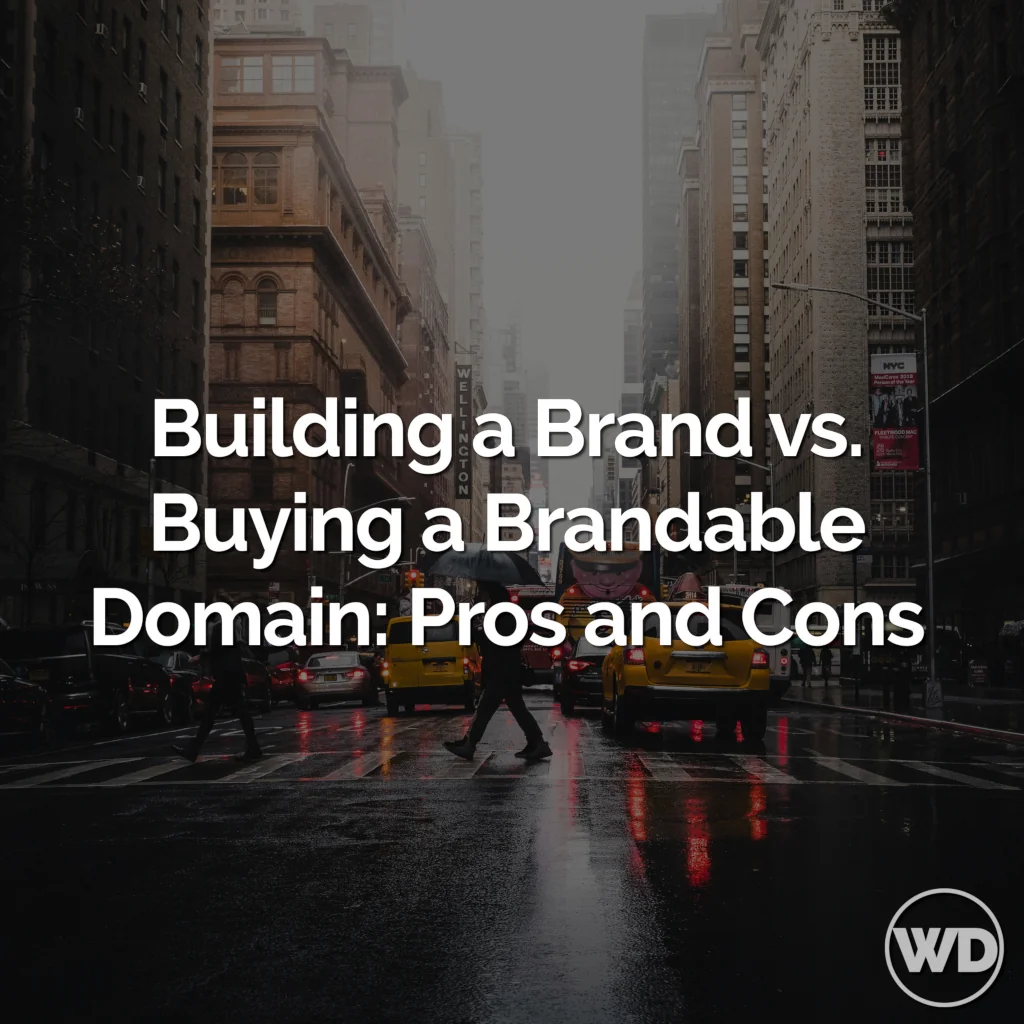Explore whether it’s better to create a new brand from scratch or purchase a pre-existing domain with brand potential.
When launching a business or expanding your online presence, choosing the right domain name is crucial for brand identity, marketing, and long-term success. One major decision many entrepreneurs face is whether to build a brand from scratch or purchase a brandable domain with existing appeal. Each approach has its advantages and challenges, so let’s explore the pros and cons of both to help you make an informed decision.
S1-E008
Building a Brand vs. Buying a Brandable Domain: Pros and Cons
Listen to this article as a fast 15-minute podcast.
Building a Brand from Scratch
Building a brand from scratch involves creating a completely unique name and establishing its identity from the ground up. This approach allows full creative freedom but also requires a larger investment of time and resources to build brand awareness.
Pros of Building a Brand
- Full Creative Control
- When you build your own brand, you have complete control over the name, messaging, and brand identity. You can craft a name that’s unique, meaningful, and perfectly aligned with your mission.
- Affordability
- Compared to buying a premium domain, creating a new brand can be relatively cost-effective. You’re not limited to high prices for domains already in demand, and standard registration costs for a new domain are usually under $20.
- Unique Positioning
- Building a brand from scratch allows you to choose a name that’s not associated with any other business. This gives you a unique space in the market, which can help avoid confusion with other companies.
- Trademark Availability
- Starting from scratch can make it easier to register a trademark for your brand name, as there’s less chance of conflicting with existing trademarks if your name is original.
Cons of Building a Brand
- Time-Consuming Process
- Building brand recognition from scratch requires time, money, and a solid marketing strategy. Consumers won’t be familiar with your name, so establishing trust and credibility will take effort.
- SEO Challenges
- Since your brand name is new, it won’t have any existing SEO value. You’ll need to build a digital presence from the ground up, including backlinks, search rankings, and user engagement.
- Risk of Irrelevance
- It can be challenging to predict how a new brand name will resonate with consumers. Names that sound great initially may not stand the test of time or may lack broad appeal if they’re too niche or trendy.
Tip: If you choose to build a brand from scratch, focus on creating a name that’s simple, memorable, and aligns with your target audience.
Buying a Brandable Domain
Buying a brandable domain involves purchasing a domain name that’s either popular, descriptive, or has existing market appeal. This can be a quick way to gain credibility and trust, especially if the domain already has SEO value.
Pros of Buying a Brandable Domain
- Instant Brand Recognition
- Purchasing a brandable domain that’s short, memorable, or has a keyword component can give your brand immediate credibility. This is especially valuable if the domain name aligns closely with your product or industry.
- SEO Advantages
- Many brandable domains have existing backlinks, traffic, or keyword relevance, which can give you a head start with SEO. A domain with history can help improve your rankings and attract organic traffic faster.
- Competitive Advantage
- A premium domain can set your brand apart in a competitive market, especially if the domain name is highly sought-after or descriptive of your niche.
- Trust and Authority
- Established domains (particularly short .com names) tend to carry authority and trust, as users associate these names with reliability and professionalism. Buying a high-value domain can add legitimacy to your brand.
Cons of Buying a Brandable Domain
- High Initial Cost
- Premium domains often come with a hefty price tag, especially if they’re short, keyword-rich, or have a history of traffic. These costs can range from hundreds to thousands of dollars, depending on demand.
- Limited Creative Freedom
- When purchasing an existing domain, you’re limited by what’s available in the market. This can restrict your ability to choose a name that perfectly aligns with your brand vision.
- Potential Trademark Conflicts
- Some brandable domains may already have associated trademarks, which could lead to legal issues if the domain’s previous use conflicts with your business.
- Risk of Negative History
- Some domains have a history of being used for spam or other dubious activities. If the domain has been penalized by search engines, it could impact your SEO efforts. Always investigate a domain’s history before purchasing.
Tip: Use tools like Wayback Machine or Ahrefs to review a domain’s history and check for any past penalties or undesirable associations.
Key Factors to Consider When Deciding
Choosing between building a brand or buying a brandable domain depends on your business goals, budget, and timeline. Here are some key factors to help you decide:
1. Budget
- If you’re working with a limited budget, building a brand from scratch may be the better option. Conversely, if you have the funds and need a quick launch, buying a brandable domain can save time and potentially provide a strong market position.
2. Timeline
- If you need to launch quickly and don’t have time to build brand recognition, a premium domain can give you an advantage. For businesses with a longer timeline, creating a brand from scratch allows for more creativity and planning.
3. Market Competition
- In highly competitive markets, a brandable domain that closely aligns with your product or service can give you a competitive edge. A memorable name in a saturated market can help attract customers and stand out from similar brands.
4. Long-Term Goals
- Think about your brand’s future. If you plan to scale or expand your offerings, ensure the domain or brand name isn’t too limiting. A name that’s too niche may become a hurdle if you plan to diversify.
5. SEO Strategy
- If SEO is a primary focus, a brandable domain with existing backlinks and authority can provide a head start. For long-term brand building, however, starting with a fresh domain might be better for shaping your own SEO path.
Case Studies: Building a Brand vs. Buying a Brandable Domain
Here are a few examples of how businesses have successfully used each approach:
Building a Brand from Scratch: Spotify
- Spotify is an example of a brand name created from scratch. The name is unique, memorable, and brandable, which has contributed to its global success. By creating an entirely original name, Spotify was able to craft a distinctive identity without any prior associations.
Buying a Brandable Domain: Hotels.com
- Hotels.com, on the other hand, demonstrates the power of a descriptive, brandable domain. With a keyword-rich name, the brand has achieved top search rankings and instant recognition, making it a leader in the travel industry. The high-value domain gave them an edge, especially in such a competitive market.
Tip: Think about whether your business would benefit from a completely unique identity or if a descriptive, brand-aligned domain would create a stronger market position.
Brainstorm a Name Based on Brand or Keywords
Simply type a brand name or keyword, and we will use some cutting edge AI to brainstorm some relevant alternatives.
Check Domain Availability
Simply click through your new domain (or the suggested alternatives) to register it today. Hurry, your competitors are thinking the same thing.
Final Thoughts: Which Option is Right for You?
When it comes to building a brand vs. buying a brandable domain, there’s no one-size-fits-all answer. Both options offer unique advantages and can lead to a successful online presence if executed thoughtfully. Here’s a quick summary to help you decide:
- Build a Brand from Scratch if:
- You want complete creative control over your brand identity.
- Your budget is limited, and you can invest time in building recognition.
- You’re focused on crafting a unique, memorable brand that resonates over time.
- Buy a Brandable Domain if:
- You have the budget to invest in a premium domain that offers instant credibility.
- SEO and immediate traffic are important to your launch.
- You’re entering a competitive market and need a name that’s relevant, trusted, and memorable.
In the end, the choice depends on your brand’s goals, industry, and resources. By weighing the pros and cons of each approach, you can make an informed decision that supports your business’s growth and sets you up for long-term success.
This guide provides a comprehensive look at the considerations involved in building a brand versus purchasing a brandable domain.






5 responses to “Building a Brand vs. Buying a Brandable Domain: Pros, Cons & How To”
This article gave me so much to think about! I’ve been debating whether to create a brand from scratch or go for a pre-existing domain with some visibility. Your breakdown of the pros and cons really clarified the risks and rewards. Thanks for the balanced perspective!
Thanks for the comment Megan. I love this article but it does help to highlight that domain availability alone can drive the naming discussion. The right name is great, but if you can’t get a complimentary domain name it probably isn’t the right name for you.
Great insights here! I like that you outlined the benefits of both approaches. As a small business owner, investing in a brandable domain feels like a shortcut, but I can see how building my brand from scratch could be more rewarding long-term. Excellent advice—I’ll be weighing my options carefully!
Couldn’t agree more. The right domain name is a brand all on its own. Valuable before you spend a single marketing dollar.
Thanks for the thorough comparison! I’ve always been curious about the value of brandable domains and whether they’re worth the investment. This article was super helpful in explaining how each option can impact SEO and brand identity. It definitely helps me feel more confident in making the right choice!